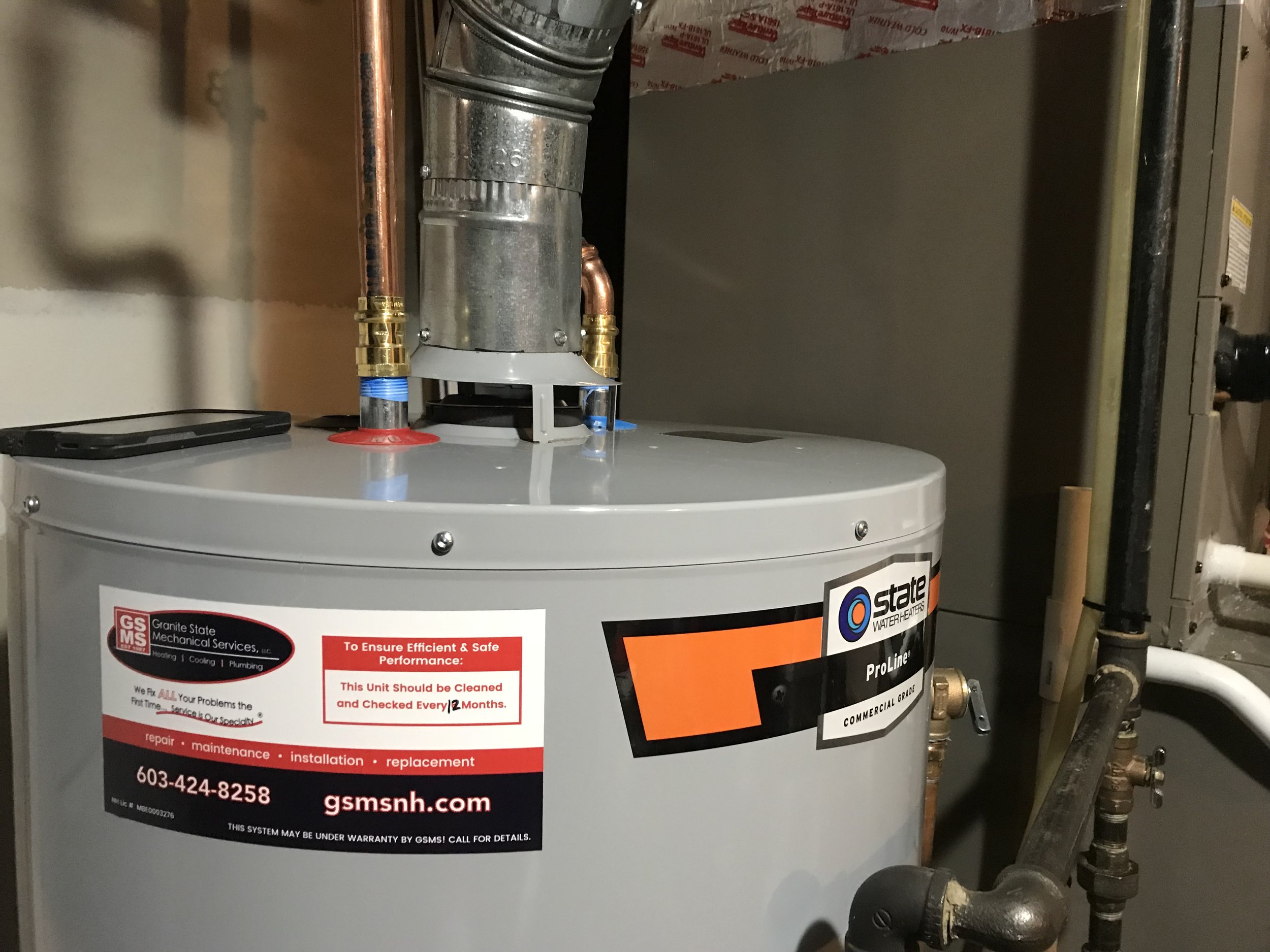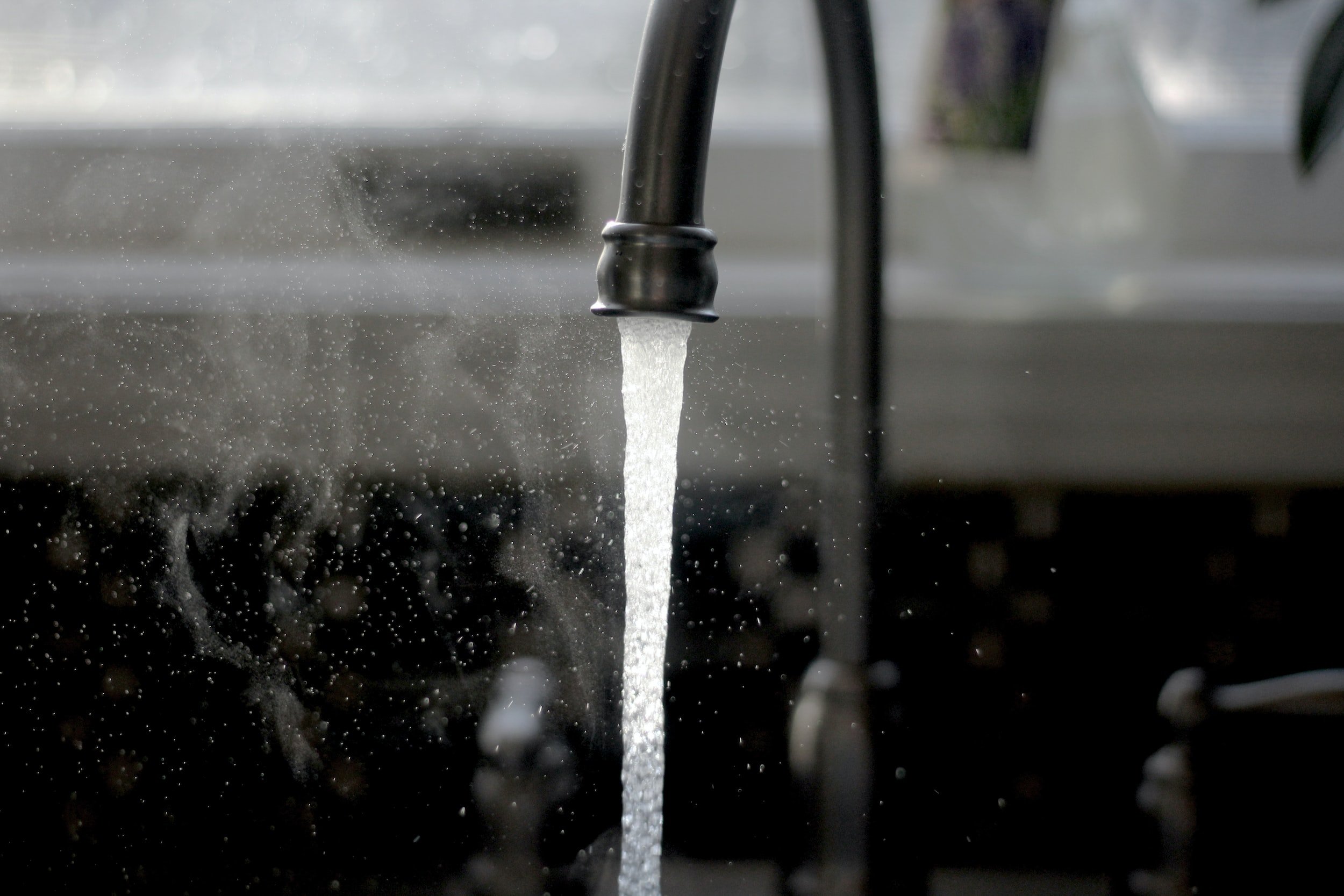What to do when you have no hot water.
Jumping into a freezing cold shower is no way to enjoy your day. Discovering you have no hot water can sometimes be a simple fix, other times it could be more and require the assistance of a plumber.
Before you make the call to your local NH plumber, let’s figure out if we can determine the issue so you can better explain your situation when they arrive.
What type of water heater do you have?
The first step to determining your issue with your water heater is to figure out what kind of heater you have. Each type of water heater has its own unique characteristics and likewise probable issues.
Standard Tank Water Heater : This is the most common type of water heater, comprising of a tank that holds cold water and is heated using gas, electricity, or oil.
Indirect Water Heater : This style water heater is also a tank that holds cold water and is heated up. Except instead of heating itself, it uses the fuel source from your boiler to heat the water up.
Tankless “On Demand” Water Heater : Tankless water heaters are becoming more and more popular due to their ability to provide endless hot water to the home. Additionally, they do not have a storage tank which allows them to be small (the size of a suitcase) and mount right on the wall. Tankless water heaters use natural gas, propane gas, or electricity to heat cold water through a heat exchanger.
Hybrid Electric Tank Water Heater : Heat pump electric water heaters are also becoming a more popular option among NH homeowners as they allow a “cleaner” operation without a point-of-use fuel yet are more efficient than your standard electric water heater. These water heaters look just like a standard tank water heater except they have a heat pump sitting on top of them which helps generate additional hot water. These units only use electricity to heat the water.
Why don’t I have hot water?
Now that you understand what type of water heater you have, you can better understand and diagnose why you don’t have hot water. Before jumping into detective mode, think of the basic issues upfront. Could you have accidentally shut off your fuel source so your water heater is unable to make hot water? Or maybe you have multiple fixtures using hot water and you drained the hot water from your tank.
Let’s look through the possibilities of what is causing you to have no hot water:
Fuel Source Issue? Although each type of water heater works differently, depending on the unit’s fuel source, specific issues could be the cause:
Check to see that your system’s pilot is lit if it has one. Sometimes the pilot can go out. Follow your unit’s directions for relighting the pilot.
You could be out of fuel! If you have propane or oil, look at your tanks and make sure your gauge is showing you have fuel available.
Take a look for your “emergency shut off switch” this is usually for an oil or gas appliance and has a red plate cover with an electrical switch. Sometimes it can get accidentally switched off. If you have one, make sure it’s on.
Faulty Part : almost all water heaters are very simple units, utilizing only a few “simple” parts to make hot water. The chance that one of your parts is in need of repair is slim. However, sometimes parts can go bad. However, if you have a tankless water heater these units utilize many small intricate parts and control boards to make hot water. With Rinnai tankless water heaters, they will display an error code on the screen to help identify the issue.
My hot water heater is working but the water isn’t hot enough.
When it checks out that your water heater is working properly but at the fixture you don’t have hot enough water, there can be a multitude of causes. Try these out for “warm hot water” issues.
Check your thermostat : On an electric water heater you have two electric elements that stick into the water heater and heat the water. You can remove the covers and check to see what the temperature settings are at. If you notice any burning or frying smell, the element could be bad. Contact your plumber to replace the element(s).
Check your burner : on a gas water heater you have a burner that heats the water from the base. The burner contains a thermocouple, gas supply tube, pilot assembly, and gas burner. Each of these parts should be free of debris and if not working properly can cause the burner not to light. Anytime gas is involved, you should have a licensed professional perform work and not DIY.
Broken Dip Tube : If you have a tank style water heater you have what is called a dip tube. The dip tube pushes the cold water entering your tank to the bottom which allows the heated water to travel to the top of your tank (where the hot water outlet is located). If your dip tube breaks, cold water could get sent directly out the hot water outlet which would cause your hot water to be warm.
Bad Mixing Valve : here in NH we have a code that requires that your hot water tank is set to 140-degrees to prevent bacteria from growing inside the tank. 140-degrees is too hot for use, so a mixing valve is installed at your tank which mixes cold water with the hot water from your tank to achieve the perfect temperature at your fixture. Sometimes, the mixing valve can get clogged up or just fail causing for inaccurate temperatures at your fixture.
Bad Shower Cartridge : are you noticing that you are just having hot water issues in your shower or tub? Most likely it is the cartridge inside your fixture that is the issue! Inside your shower valve you have what is called a cartridge which mixes the hot water with cold water and provides the perfect temperature out of your shower head. If that gets junked up or fails, you will have hot water issues.
What to do next?
Having no hot water is stressful. Although it’s not the worst thing in the world to have happen, it certainly is no joy. Now that you have a solid understanding of your water heating issue, you can determine a repair on your own path or reach out to your plumber for assistance.
Keep in mind that the average water heater has a lifespan of 6-10 years here in New Hampshire. If your tank is in that timeline, it may be time to consider a water heater replacement. These days, a water heater replacement can range from $1,200 up to $4,000. Of course, the factors that determine this are the type of heater your home needs, fuel source, and installation requirements.
Tankless water heaters cost more upfront, however they have many energy efficiency benefits which can lead them to costing less to run compared to a standard tank.
From hot water heater repairs to maintenance or if you’re interested in upgrading your hot water heater, feel free to reach out. Our team of Service Specialists are always here ready to help you.



